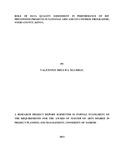| dc.contributor.author | Ngumbau, Valentine M | |
| dc.date.accessioned | 2013-09-17T13:23:58Z | |
| dc.date.available | 2013-09-17T13:23:58Z | |
| dc.date.issued | 2013 | |
| dc.identifier.citation | Master of Arts Degree in Project Planning and Management | en |
| dc.identifier.uri | http://erepository.uonbi.ac.ke:8080/xmlui/handle/123456789/56615 | |
| dc.description | A research project report submitted in partial fulfillment of
the requirements for the award of Master of Arts Degree in
Project Planning and Management, University of Nairobi | en |
| dc.description.abstract | HIV and Aids has been a global pandemic since the first cases were discovered in the early
1980’s. Statistics from the Foundation for AIDS Research estimate that 34 million people are
living with the virus worldwide with an estimated 2.5 million new infections every year as at
2011. In Kenya, as at December 2011, 1.6 million people were living with the virus. These
statistics especially those on new infections, have led to prevention projects that aim to educate
the population on how to prevent the spread of the virus and in the fore front of these efforts is
the National AIDS and STI Control Program which was established in 1987 to help the
government in the fight against HIV. The objectives of this research was to investigate how the
data collection and informative process of DQA works to influence performance of these
projects, to identify how the operating procedures of DQA influence project performance and
establish how data quality improvement in DQA influences performance of these projects. A
descriptive survey research design was used in this study and from the population selected;
stratified random sampling as well as purposive sampling was used to choose the desired sample.
Data was collected through the use of questionnaires and interview guides and data collected was
analyzed using The Statistical Package for Social Sciences program. The findings of the study
showed that data collection procedures and tools as well as dissemination of DQA information
played a role in performance of projects. It also found that there were standard operating
procedures in the projects under the study that made the processes efficient and effective and
also found data quality improvement can be worked on as the projects evolve. The study
revealed that data collection tools and procedures play a major role in the quality of data
produced and that the dissemination of the findings of DQA will improve the quality of data. It
also revealed that standard operating procedures need to be present in the DQA process and how
data quality improvement provides a quality spectrum in the DQA process. The study concluded
that there was more that needed to be done to enhance DQA such as adopting technology and
follow up in the usage of the procedures as well as providing the staff dealing with DQA a more
targeted training so as to improve their skills which will in turn lead to an overall improvement
of data quality. It recommended that there should be project websites to track progress and help
in dissemination as well as having targeted training based on the job description. | en |
| dc.language.iso | en | en |
| dc.publisher | University of Nairobi | en |
| dc.title | Role of data quality assessment in performance of HIV prevention projects in national aids and STI control programme, Nyeri County, Kenya | en |
| dc.type | Thesis | en |
| local.publisher | Facuty of Arts | en |

